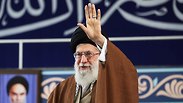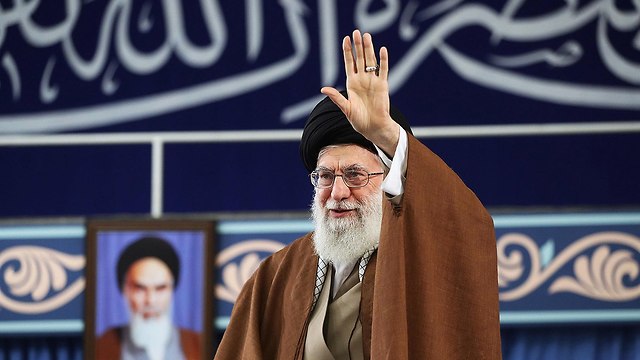
Iran's Supreme Leader Ayatollah Ali Khamenei
Photo: MCT

'A great betrayal of the Islamic world': Iran urges Gulf rivals not to back US peace plan
Iran's Supreme Leader Khamenei slams Saudi Arabia and Bahrain for supporting U.S. Middle East peace plan in live address during Eid al-Fitr prayers, ahead of economic workshop initiated by U.S., boycotted by Palestinians
U.S. allies Saudi Arabia and the United Arab Emirates are set to attend the Bahrain conference
Iran's Supreme Leader Ayatollah Ali Khamenei on Wednesday warned regional rivals Saudi Arabia and Bahrain not to support the U.S. Middle East peace plan, slamming the forthcoming deal as a "great betrayal of the Islamic world."
Washington is preparing to roll out the economic aspects of its long-awaited plan to resolve the Israeli-Palestinian conflict at a conference in Bahrain later this month.
"The aim of this conference is to realize America's traitorous, dastardly plan on Palestine which they have named the 'deal of the century,'" Khamenei said in a live address during prayers marking the Eid al-Fitr holiday in Tehran.
"The 'deal of the century' will, god willing, never take root... this is a great betrayal of the Islamic world. We hope the leaders of Bahrain and Saudi (Arabia) will realize into what a quagmire they are stepping and how harmful it will be for their future."
U.S. allies Saudi Arabia and the United Arab Emirates are set to attend the Bahrain conference on June 25-26, but the Palestinians are boycotting it and have encouraged other Arab states to stay away.
Bahrain insists their only aim in hosting the "Peace for Prosperity" workshop is to help the Palestinians “enhance their resources to achieve their legitimate aspirations," reiterating that their country continues to support the Palestinian goal of an independent state.
Calling the plan "dead on arrival" Palestinians already view the U.S. proposal as blatantly biased towards Israel, citing the U.S. recognition of Jerusalem and transfer of its embassy and slashing funding for the UN agency for Palestinian refugees as evidence that the plan will not meet their demands.
Palestinians cut off all contacts with the Trump administration since the president broke with decades of bipartisan policy to recognize Jerusalem as the capital of Israel in December 2017.
















